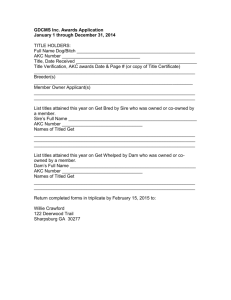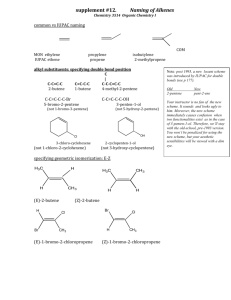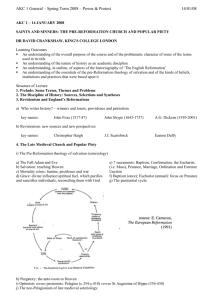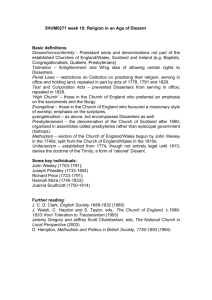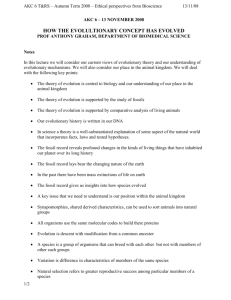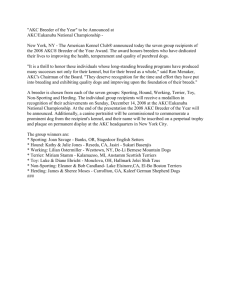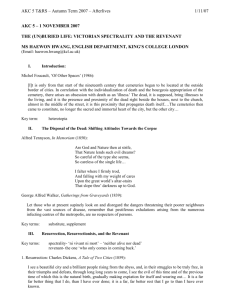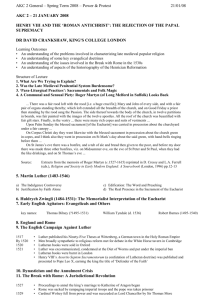Lecture 6 - King's College London
advertisement
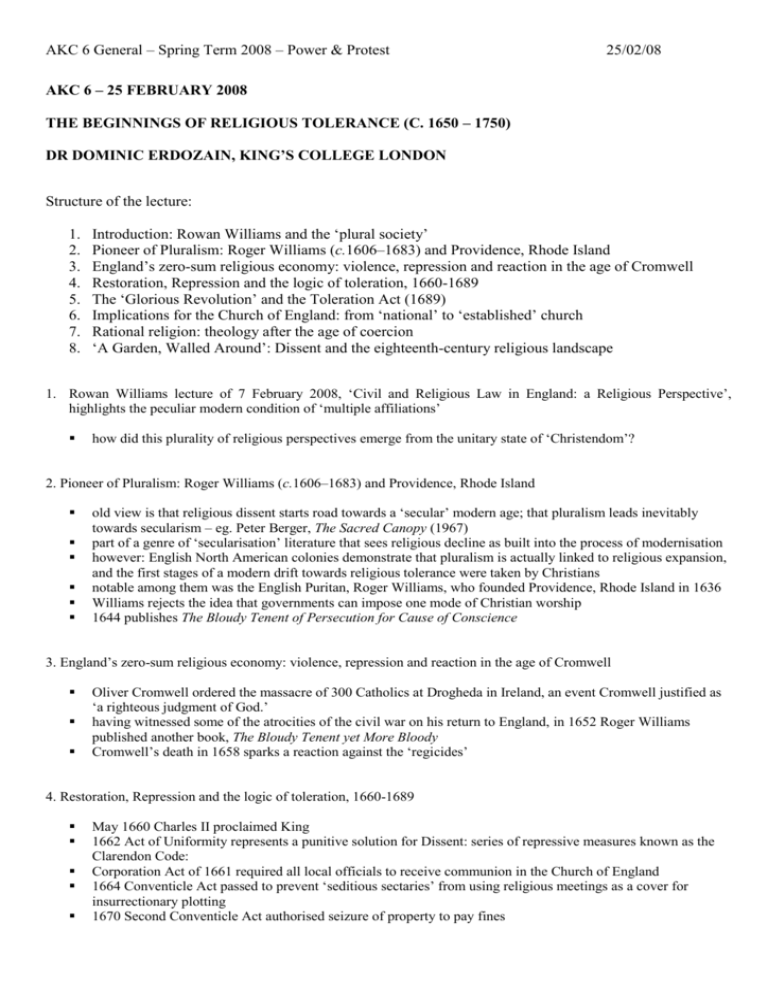
AKC 6 General – Spring Term 2008 – Power & Protest 25/02/08 AKC 6 – 25 FEBRUARY 2008 THE BEGINNINGS OF RELIGIOUS TOLERANCE (C. 1650 – 1750) DR DOMINIC ERDOZAIN, KING’S COLLEGE LONDON Structure of the lecture: 1. 2. 3. 4. 5. 6. 7. 8. Introduction: Rowan Williams and the ‘plural society’ Pioneer of Pluralism: Roger Williams (c.1606–1683) and Providence, Rhode Island England’s zero-sum religious economy: violence, repression and reaction in the age of Cromwell Restoration, Repression and the logic of toleration, 1660-1689 The ‘Glorious Revolution’ and the Toleration Act (1689) Implications for the Church of England: from ‘national’ to ‘established’ church Rational religion: theology after the age of coercion ‘A Garden, Walled Around’: Dissent and the eighteenth-century religious landscape 1. Rowan Williams lecture of 7 February 2008, ‘Civil and Religious Law in England: a Religious Perspective’, highlights the peculiar modern condition of ‘multiple affiliations’ how did this plurality of religious perspectives emerge from the unitary state of ‘Christendom’? 2. Pioneer of Pluralism: Roger Williams (c.1606–1683) and Providence, Rhode Island old view is that religious dissent starts road towards a ‘secular’ modern age; that pluralism leads inevitably towards secularism – eg. Peter Berger, The Sacred Canopy (1967) part of a genre of ‘secularisation’ literature that sees religious decline as built into the process of modernisation however: English North American colonies demonstrate that pluralism is actually linked to religious expansion, and the first stages of a modern drift towards religious tolerance were taken by Christians notable among them was the English Puritan, Roger Williams, who founded Providence, Rhode Island in 1636 Williams rejects the idea that governments can impose one mode of Christian worship 1644 publishes The Bloudy Tenent of Persecution for Cause of Conscience 3. England’s zero-sum religious economy: violence, repression and reaction in the age of Cromwell Oliver Cromwell ordered the massacre of 300 Catholics at Drogheda in Ireland, an event Cromwell justified as ‘a righteous judgment of God.’ having witnessed some of the atrocities of the civil war on his return to England, in 1652 Roger Williams published another book, The Bloudy Tenent yet More Bloody Cromwell’s death in 1658 sparks a reaction against the ‘regicides’ 4. Restoration, Repression and the logic of toleration, 1660-1689 May 1660 Charles II proclaimed King 1662 Act of Uniformity represents a punitive solution for Dissent: series of repressive measures known as the Clarendon Code: Corporation Act of 1661 required all local officials to receive communion in the Church of England 1664 Conventicle Act passed to prevent ‘seditious sectaries’ from using religious meetings as a cover for insurrectionary plotting 1670 Second Conventicle Act authorised seizure of property to pay fines AKC 6 General – Spring Term 2008 – Power & Protest 25/02/08 John Bunyan, a tinker who travelled about preaching, was imprisoned in 1660 for twelve years under an Elizabethan act and wrote the first part of Pilgrim’s Progress in Bedford gaol. 1673 Test Act required holders of civil and military office to receive communion in the Church of England and make a declaration against transubstantiation 5. The ‘Glorious Revolution’ and the Toleration Act (1689) Charles II’s successor James II antagonised even those Protestants who had initially supported him by appointing Catholics to important positions in 1687 he issued a declaration which proclaimed freedom of worship and removed many of the safeguards against Catholicism When instructions were given that a further ‘Declaration of Indulgence’ be read in all churches, 95 per cent of London clergy refused to comply late in 1688 James fled the country and by effectively vacating the throne enabled most of his subjects to transfer their allegiance to William and Mary Williams sees that some sort of toleration of Dissent (if not Catholicism was necessary) The 1689 Toleration Act effectively legalised Dissent 6. Implications for the Church of England: from ‘national’ to ‘established’ church The Act instantly modified the role of CofE – from ‘National’ to ‘Established’ Church – ‘and she took it badly’ A number of churchmen persisted in preaching against toleration, insisting that Dissenters remained guilty of schism Breakdown of Restoration consensus opened up theological divisions: party conflict between ‘High Church’ and the theologically broad ‘Latitudinarians’ 7. Rational religion: theology after the age of coercion Further inroads into the historic authority of the Church were made by the rationalist teachings of Arians, Socinians, Unitarians and Deists – tendency to interpret Christianity in more humanistic terms, seeing Christ as the perfect man but not God 8. ‘A Garden, Walled Around’: Dissent and the eighteenth-century religious landscape after the Toleration Act, Dissenters grew in confidence and numbers, especially in towns: by 1715 almost 65% of Dissenting congregations were located in towns licences for meeting-houses reached 3,900 by 1710, with well over 300 new permanent structures some of the urban congregations seem to have exceeded a thousand ‘hearers’, with as many as 2,000 reported in Taunton In the hymns of Isaac Watts they were also responsible for establishing the modern tradition of hymody Full details about the AKC course, including copies of the handouts, can be found on the AKC website at: http://www.kcl.ac.uk/akc. Please join in the Discussion Board and leave your comments. If you have any queries please contact the AKC Course Administrator on ext 2333 or via email at dean@kcl.ac.uk. Please note the AKC Exam is on Monday 21 April 2008 between 14.30 and 16.30. You must register for the course, using the form on the website, before registering for the exam. EXAM REGISTRATION is now open. Please reply to the email you will have received giving your full name and student ID number. The deadline for AKC exam registration is Thursday 20 March 2008. The next AKC Forum is Monday 3 March, from 17.00 until 19.00, Room G.12, New Hunts House, Guy’s Campus.
